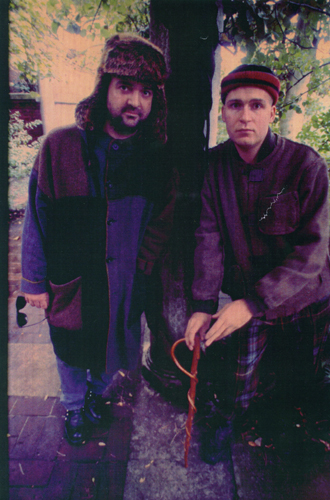

Drawing on esoteric notions of alchemy and magick, the music of Coil maps a hidden world of altered perspectives and arcane practices. This article originally appeared in The Wire 134 (April 1995).
In an age of mercurial genre-crossings and mongrel hybrids, Coil remain pure, uncontaminated; pursuing a singular vision in documenting an unconventional, yet enormously valid, world view. "Certain tracks on certain Coil records are designed to trigger altered states, whether this happens or not is to some extent up to the listener," states the group's John Balance, outlining one of Coil's fundamental concerns. "Without wishing to sound pompous, we want to make sacred music. I don't mean something that assumes Messianic proportions or delusions, but I think all good music should be an attempt to change people's mind-sets."
Balance comprises one third of Coil (the other members being ex-Throbbing Gristle agitator Peter 'Sleazy' Christopherson and recent addition Drew McDowall) and is eager to pursue this subject. "I would regard some of La Monte Young's music as sacred. Beefheart also, in an animistic sense. I think his music has a very powerful shamanic quality to it. Music conceived as pure entertainment I do have a problem with, but then again certain music which is perceived as pure entertainment I would regard as having these qualities; for instance, Martin Denny, Also Acid House, because like The Butthole Surfers at their best, it took you to a point of brilliant madness."
For over a decade Coil have warped, twisted and transmitted sound in a manner pertinent to their immersion in the world of esoteric ideas. On 1985's Scatology, the inspiration was explicitly alchemical theories. "Scatology contained numerous references to the alchemical process," says Balance. "I'm obsessed with the idea of turning base matter into gold, transmuting base materials, i.e. raw sound, into something else - the gold in the process. We recorded some rather peculiar practices which we then transformed and manipulated in accordance with our specific aims."
This idea of an alchemy of sound is an area they plan to re-explore for their forthcoming album on Trent Reznor's Nothing label, Backwards.
"With Backwards we're returning to a lot of our original ideas and intentions. On recent material we've used synths a great deal, but this time we want to go out and make recordings in the wild and process them, twisting them around."
Coil's desire to process, twist and warp their sonic content has led to the development of what they term, in homage to Occult artist Austin Osman Spare, Sidereal Sound: "Obviously the term sidereal relates to stars, but also through wordplay to looking at reality sideways, from a new angle or perspective. So as Spare twisted images in space, we adopt a similar process with sound. We've always been into sonic deviation and experimentation."
Coil's techniques of sound transfiguration adumbrate certain developments in post-Techno and the isolationist end of the Ambient spectrum. This is now being acknowledged, if somewhat belatedly. The group's influence is readily detectable in the work of Scanner (eavesdropping on mundane conversations was pursued by Sleazy back in TG days), several of the 'Isolationists' as well as Autechre (who have consistently namechecked Coil of late). "There are some interesting connections developing," says Balance, referring to the group's forthcoming collaborations with Autechre, Atom Heart, Bill Laswell and Tetsu Inoue.
In the meantime, Coil have been working with William Burroughs. "We worked with William on a track for Backwards. What interested me about William is his mind, not of his voice. So that is what we wanted to capture. When we were working on the Ministry video "Just One Fix" [directed by Coil and featuring Burroughs] we asked him to recite certain key words and phrases for us. This material has a shamanic quality to it, really it is a magickal spell. This is where we connect with William; he describes the invisible world, he documents the hidden mechanisms. This is what we also seek out; the secret mechanisms, the Occult, if you like, given that Occult simply means hidden."
With so many artists currently flirting with Occult symbolism, grasping the shadow rather than the substance, it is heartening to see artists such as Coil, Bill Laswell, David Toop & Max Eastley, even Julian Cope exploring arcane knowledge with lucidity and intelligence. "I think the majority of people interested in the Occult are just confused," suggests Balance. "Those with a genuine interest have something valid to communicate. I think somebody like Julian Cope, in his Arch-Drude phase, has common interests with us. I like people who have a tendency to be hermetic, abrasive, out of step, but usually ahead of their time.
"I also have a great interest in the idea of sensory derangement being a path to illumination. We toyed with the idea of calling our next album God Please Fuck My Mind For Good, which is a quote from Beefheart where the double meaning appeals to me. Love's Secret Domain was an instance of this; on that album we were pushing things too far, both mentally and physically. Both myself and Stephen Thrower [ex-Coil member] started seeing spectral presences in the studio, which looked like the mummified figures of ancient kings and queens. After finishing that record I collapsed on the floor, not knowing who I was or where I was."
Coil's next release documents a variety of their esoteric interests. Entitled The Sound of Music it compiles the music they contributed to Derek Jarman's films Journey to Avebury and Blue, as well as the unreleased soundtrack to Clive Barker's Hellraiser. Also imminent is their first album ELpH, Worship The Glitch: "ELpH is when we no longer recognize our presence in music,"explains Balance. "It's the idea of taking the dead spaces, the mistakes and extending them."